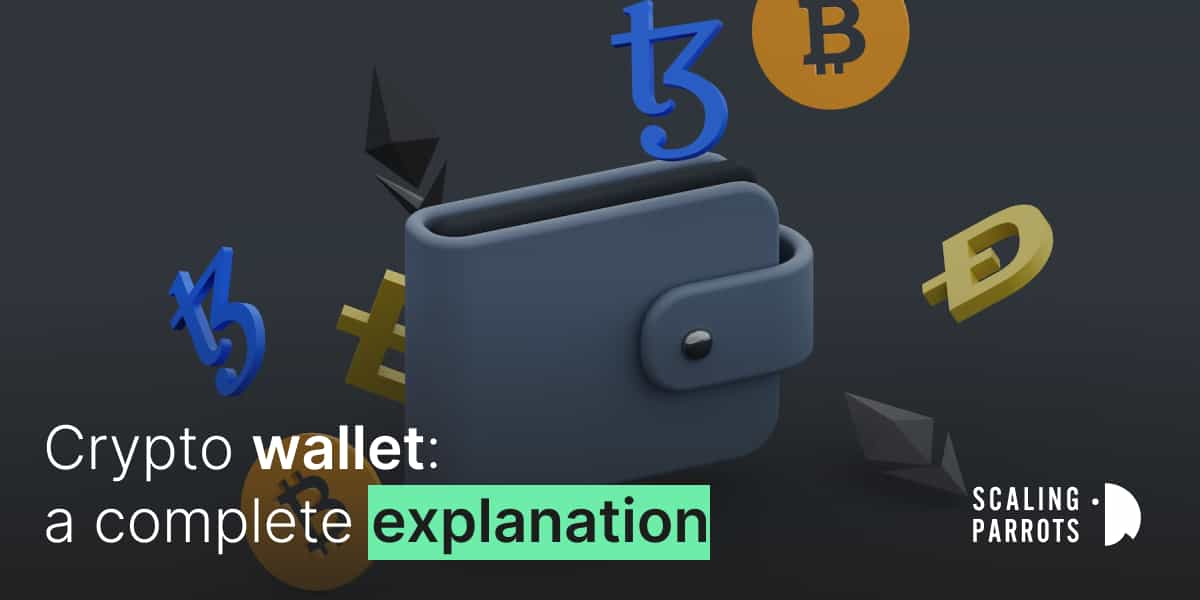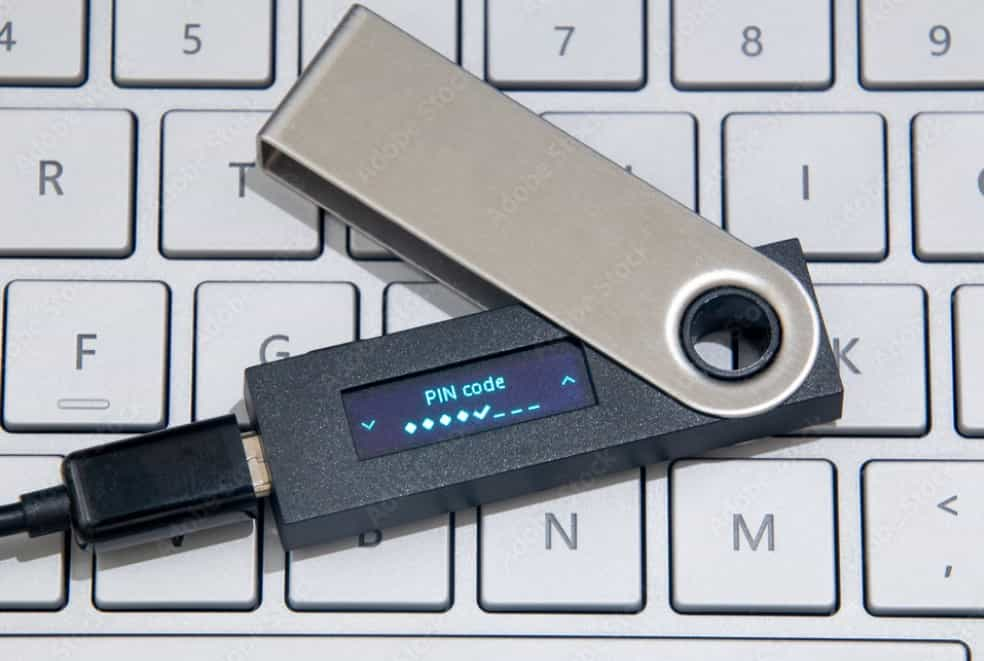
Just like you need a wallet to keep your cash and credit cards, you also need to know where you will store your cryptocurrency. When you buy digital currencies on a trading or exchange platform (“exchanges”), you may be able to keep the “keys” to your cryptocurrencies in your account. This is a type of storage.
However, you can also transfer them away from the platform to a personal crypto wallet (“crypto wallet”), which can be software that is connected to the internet (an active wallet) or a completely offline device (cold storage).
Using one allows you to keep your cryptocurrency safe while also transacting. It is reasonable to consider your cryptocurrency wallet to be a secure location to store your cryptocurrency.
The underlying reality, however, is quite different. A cryptocurrency wallet is a user interface allowing you to access your cryptocurrency information on the underlying Blockchain.
And also allow you to receive funds from other users and send funds to others by writing transactions to the Blockchain.
But what exactly is a crypto wallet, how does it work, and what are the types of crypto wallets? Read on to find out.
What is Crypto Wallet
A cryptocurrency wallet is a place to keep your digital currency, similar to how a regular wallet stores physical currency when not in use. It is a digital wallet that lets you store, send, and receive bitcoin.
Because the crypto wallet ensures the protection of cryptocurrencies, it is seen as a tool that must be used with caution.
After validating a cryptocurrency transaction, it is reflected and recorded in the Blockchain, and the wallet stores and provides access to transaction details. As a result, the cryptocurrencies kept on the network belong alone to the owner user.
To transact in cryptocurrency, you only need two things:
- The address of your wallet (also known as the public key).
- Your private key.
A public key is similar to your bank account number. You can give it to others or institutions so that they can send you money or withdraw money from your account when you authorize it.
These individuals typically regard your public keys as a wallet address, a hashed or compressed version of that public key. On the other hand, a private key is similar to your bank account’s password or the PIN for your debit card.
If the user forgets his access password (private key), he will be unable to recover the cryptocurrency stored in the wallet. It is an especially critical consideration given that numerous people who had previously purchased cryptocurrencies could not utilize them because they had forgotten their wallets’ passwords.
Cryptocurrencies are not stored in your wallet as purely digital currency. Instead, the wallet saves information and details about your public and private keys, which correspond to your ownership stake in the cryptocurrency. You can send and receive cryptocurrency using these keys while keeping your private key encrypted.
However, the security of a crypto wallet is dependent not just on the private key but also on a public key, which represents the wallet’s actual public address.
The public key is essential to share the wallet with other users who wish to transfer cryptocurrencies and is represented by a complex string of characters, typically a QR code. It might be identified as an e-mail account to comprehend its significance altogether.
How does Crypto Wallet work
Crypto wallets are available in either software or hardware form. Though each type works slightly differently, they are all meant to provide secure access to whatever cryptocurrency you own.
It should be noted once again that a crypto wallet does not contain any actual cryptocurrency. It instead stores the public and private key information required for crypto transactions.
The cryptocurrency is held on a blockchain, which is a form of digital record that serves as the foundation for numerous decentralized cryptocurrencies.
The Blockchain is a public database in which crypto-related data is stored in the form of blocks. These blocks store records of all cryptographic transactions as well as the owners of the corresponding keys.
These addresses are stored in software within a crypto wallet, which allows crypto holders to transact with the currencies they own.
When sending cryptocurrency to someone, it is critical to use the correct addresses. For example, if you send Bitcoin to an Ethereum address, your cryptocurrency and cash will be lost.
If users misplace their wallet, they can retrieve it using a mnemonic phrase known as a seed. Keeping private keys and seed phrases safe is critical for avoiding internal and external threats that could damage a user’s cryptocurrency.

Types of Crypto Wallets
There are basically two types of crypto wallets. The
- Hot Wallet
- and Cold Wallet
We will discuss these two types of crypto wallets right away.
1. Hot Wallets
Hot wallets connect to the internet and often provide less security. They also provide greater accessibility due to their internet connection. Even though hot wallets are susceptible to fraudsters and hacker attacks, they are extremely user-friendly.
Hot wallets are of various types, including desktop wallets, web wallets, and mobile wallets.
Desktop Wallet
Desktop wallets encrypt users’ private keys on their computer hard drives.
Downloading an application to your desktop or PC is required for desktop wallets. The application will aid in the creation of a data file containing the users’ keys.
Users must also create a password to access the keys. Desktop wallets give you ownership of your key, but there is a risk of physical damage or malware/virus infection.
Many desktop wallets support many assets and have additional features such as built-in exchanges, portfolio charts, etc.
But like other hot wallets, they can be vulnerable to Internet threats. Yet, depending on the user’s security procedures, they are typically thought to be more secure than web wallets which we will discuss next.
Web Wallet
Web wallets are provided by a third party, typically a cryptocurrency exchange, allowing users to access their holdings using a web browser.
Web wallets are a popular type of crypto wallet in the hot wallet category. Web wallets can be accessed using a web browser without downloading any specialized software or applications.
Web wallets provide access to crypto assets from any location using your password, a device, and a web browser via browser access. The website would own the keys to your crypto assets in the case of web wallets.
Web wallets are simple to use and do not require any installation, and they can benefit from advanced purchasing and selling options (some centralized exchanges).
Web wallets don’t give you access to your private keys or secret recovery phrase, which means you don’t have control over your money and are entrusting it to someone else (the website owners) to keep and protect.
They’re not very secure because they’re accessed through a web browser (which makes them vulnerable to hacks and other exploits) and are hosted on a centralized server (honeypot for hackers).
Unlike other wallets, they do not always have in-wallet exchange features.
Mobile Wallet
Mobile wallets enable users to send or receive cryptocurrency quickly and securely wherever they have their phone and an active internet connection.
Mobile wallets, which have functionality similar to desktop wallets, are another essential crypto wallet category in hot wallets. You must install a mobile application on your mobile phone that will function as a hot wallet.
Mobile wallets provide greater flexibility for exchanging funds, but they also pose some security risks. They can be used on the go; this is especially useful for making in-person payments to merchants who accept cryptocurrency.
Most mobile wallets give you complete access to private keys and secret recovery phrases, giving you complete control over your funds. Internet-based risks may exist depending on the user’s security practices.
Someone could gain access to your phone, for example, if you don’t have a password to unlock it and do away with the funds in your mobile wallet.
2. Cold Wallets
The term “Cold storage” refers to wallets that keep users’ crypto tokens in offline mode. As a result, they function as vaults for everyday transactions. Surprisingly, some cold wallets can connect to the internet while performing their essential functions.
Cold wallets, which may operate without an internet connection, provide additional security.
As a result, it is obvious that persons with a bigger amount of crypto assets would profit more from cold wallets. However, combining cold and hot wallets may provide more value for crypto users.
For example, a significant portion of assets could be securely housed in a cold wallet, while the hot wallet provides greater flexibility for funds.
Combining the two crypto wallet categories, a hybrid approach could provide improved security and flexibility.
Cold wallets are of two types which are hard wallets and paper wallets.
Hard Wallets
Hard wallets are physical devices that manage public addresses and keys independently. It has the appearance of a USB with an OLED screen and side buttons. It is a battery-free device that can be connected to a computer and accessed through native desktop apps. It can cost between $70 and $150, but it is well worth it.
For long-term storage of one’s crypto wealth, specially designed hardware devices such as Trezor are regarded as the best in crypto security. These devices use USB ports to connect to your computer and mobile device, allowing you to send and receive data because this is the most convenient and secure way to store and manage your cryptocurrency.
The hard wallets have advanced security features. Their private keys are never sent outside the hardware wallet, keeping them safe from malware and hackers. The user on the device itself approves all transactions.

Paper Wallets
It is a wallet with a QR code that is physically printed. Some wallets allow you to download the code to generate new addresses offline. They are not vulnerable to hacking, but the number of flaws makes them dangerous.
The inability to send partial funds is a major flaw. As a result, it cannot be reused. They were popular for cold storage before the introduction of hardware wallets. Overall, paper wallets can be created with stringent security precautions.
Paper wallets are not as accessible for everyday transactions as desktop wallets and other hot wallets. Someone may access the paper wallet and take your money without an internet connection.
They can sustain damage from things like fires and the natural decay of paper over time, but the damage is generally preventable by utilizing stronger materials.
Features of Crypto Wallet
The following are some features of crypto wallets:
- Minimal transaction costs. Compared to using regular banks, the cost of money transfers is significantly lower with crypto wallets.
- It allows for instant global transactions. Additionally, there are no barriers and no middlemen involved.
- It’s simple to use. It functions exactly like any other piece of software or wallet that you may use for regular transactions.
- It’s extremely secure. You only need to protect your private key.
- Permits exchanges between different cryptocurrencies. You can easily convert currencies thanks to this.
Why are Crypto Wallets important
Cryptocurrency can be accumulated and used for various things, just like any other currency. Like a bank account is for fiat currency, crypto wallets play a fundamental role in making cryptocurrencies functionally usable for people and organizations.
Crypto wallets are necessary for several crucial tasks that enable cryptocurrency to be used practically. The following are a few of the factors that make crypto wallets important:
- Management of cryptocurrencies. Users can check their cryptocurrency holdings’ balances using crypto wallets.
- Access to decentralized applications (dApps). A crypto wallet is necessary to connect to and interact with Web 3.0 dApps.
- User identities. A blockchain is used to store all cryptocurrencies. A cryptocurrency wallet allows transactions to take place using a username that may be connected to a blockchain’s public key address.
- Key administration. Cryptocurrency is technically represented on the Blockchain as a public key address. Users can control the private encryption keys needed to access a specific address and enable transactions using a crypto wallet.
- Transactions. Crypto wallets’ ability to send and receive bitcoin payments is crucial and the main reason they are required.
Conclusion
We have seen what a cryptocurrency wallet, also known as a crypto-wallet, is, how it works, and its various types and importance.
The kind of cryptocurrency wallet you choose to use will rely on factors, including your trading profile, the degree of hacker security, usability, and connection.
It is advised to use offline wallets or cold wallets (like the hardware wallet or the paper wallet) for security if you intend to preserve your crypto assets for a very long time.
On the other hand, it is advised to use online or hot wallets, which enable you to complete swift online buy and sell transactions if you engage in speculative operations involving crypto-currencies.
See you soon,
Scling Parrots
